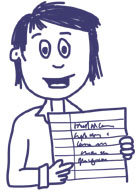
Electromagnetism
Electromagnetism deals with the interaction between electric currents and magnetic fields. It is used in physics for powering electric motors to convert electrical energy into mechanical energy, driving motion. It's also used to generate electricity in generators, and adjusting voltage levels in transformers.
What are magnets and magnetic fields?
Magnets are objects that produce a magnetic field and can attract certain materials, such as iron, nickel, and cobalt. They come in various shapes and sizes, but they all have two main properties:
- Attraction and Repulsion: Magnets can attract certain materials (like iron) and repel others (like other magnets with the same pole orientation).
- Poles: Magnets have two ends called poles: a north pole and a south pole. These poles are where the magnetic force is strongest. If you suspend a bar magnet freely, it will align itself in a north-south direction because of Earth's magnetic field.
A magnetic field is the region around a magnet where its magnetic force can be detected. It's like an invisible force that extends from the magnet. Here are some key points about magnetic fields:
- Direction: Magnetic field lines always run from the north pole to the south pole outside the magnet and from the south pole to the north pole inside the magnet.
- Strength: The strength of a magnetic field is strongest close to the magnet's poles and decreases as you move away from them.
- Interaction: Magnetic fields interact with each other. If you bring two magnets close together, their magnetic fields will either attract (opposite poles) or repel (like poles) each other.
You can visualize magnetic fields using iron filings or a magnetic compass. Iron filings will align themselves along the magnetic field lines, showing the pattern of the magnetic field. A magnetic compass needle will align itself with the magnetic field, pointing north due to Earth's magnetic field.
What is Electromagnetism?
Electromagnetism is the relationship between electricity and magnetism. When electric charges move, they create a magnetic field. Similarly, a changing magnetic field can induce an electric current to flow.
An electromagnet is a type of magnet that is created by passing an electric current through a coil of wire. When the current flows through the wire, it generates a magnetic field around the coil. The strength of the magnetic field can be controlled by changing the amount of current flowing through the wire or by changing the number of turns in the coil. Here is how they work:
- A coil of Wire: An electromagnet consists of a coil of wire, usually wrapped around a core made of iron or other magnetic materials.
- Electric Current: When an electric current flows through the wire, it creates a magnetic field around the coil. The magnetic field produced is stronger when the current is stronger and when there are more turns of wire in the coil.
- Magnetic Polarity: The direction of the magnetic field around the electromagnet depends on the direction of the electric current flowing through the wire. By changing the direction of the current, you can change the polarity of the electromagnet (i.e., which end is north and which is south).
- Applications: Electromagnets are used in a wide range of applications, including electric motors, speakers, MRI machines, magnetic locks, and cranes.
What is motor effect?
The motor effect describes how a current-carrying wire placed in a magnetic field experiences a force. This force causes the wire to move, and it's the principle behind the operation of electric motors, which are widely used in various devices and machinery.
How does it work?
When an electric current flows through a wire, it creates its own magnetic field around it. This magnetic field interacts with any external magnetic field present in the surroundings. If the wire is placed in a magnetic field, such as that produced by a permanent magnet or an electromagnet, the two magnetic fields interact, resulting in a force being exerted on the wire. This force is known as the motor force.
The direction of the motor force on the wire can be determined using Fleming's Left-Hand Rule. According to this rule, if you point your thumb in the direction of the current, and your index finger in the direction of the magnetic field, then your middle finger will point in the direction of the force acting on the wire. This helps determine the direction of motion of the wire when subjected to the motor effect.
The motor effect is a crucial principle utilized in the operation of electric motors. In an electric motor, a coil of wire (known as an armature) is placed in a magnetic field, and a current is passed through the wire. The resulting motor force causes the wire to rotate, creating mechanical motion. This rotational motion can then be used to drive machinery, such as fans, wheels, or conveyor belts, making electric motors essential components in countless applications, from household appliances to industrial machinery.
Electromagnetism
Key Words
Permanent magnets - produce their own magnetic field.
Induced magnets - magnetic materials that turn into a magnet when they're put into a magnetic field.
Solenoid - a coil of wire that increases the strength of the magnetic field.
Conductor - a material that allows energy to pass through it.
Magnetic flux density - how many field (flux) lines there are in a region.
The Generator Effect - creates a potential difference in a conductor and a current if the conductor is part of a complete circuit.
Potential difference - the driving force that pushes the charge around (volts V).
Alternators - generate alternating current.
Dynamos - generate direct current.
Oscilloscope - show how the potential difference generated in the coil changes over time.
Microphones - loudspeakers in reverse.
Transformers - change the size of the potential difference of an alternating current.
Step-up Transformers - step the potential difference up.
Step-down Transformers - step the potential difference down.
Also see Circuits



